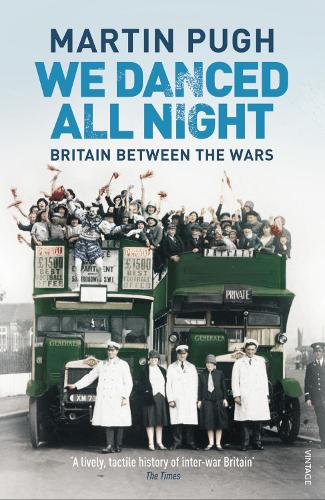
We Danced All Night: A Social History of Britain Between the Wars
(Paperback)
Publishing Details
We Danced All Night: A Social History of Britain Between the Wars
By (Author) Martin Pugh
Vintage Publishing
Vintage
15th July 2009
2nd July 2009
United Kingdom
Classifications
General
Non Fiction
European history
941.083
Physical Properties
Paperback
528
Width 129mm, Height 198mm, Spine 31mm
362g
Description
So often, the period between our two World Wars is portrayed as a time of unremitting poverty, rising crime and mass employment. But what if there was another side to the story, one of dancing, cinema-going and football pools Bounded by the Great War on one side and by the looming shadow of the Second World War on the other, the inter-war period has characteristically been portrayed as a time of great and unrelenting depression. In Martin Pugh's lively and thought-provoking book, however, the acclaimed historian vividly shows how the British people reacted to the privations of wartime by indulging in leisure and entertainment activities of all kinds - from dancing and cinema going to smoking, football pools and paid holidays. He explodes the myths of a nation of unwed women, revealing that in the 1930s the institution of marriage was reaching its heyday, and points to a rise in real incomes, improvements in diet and health and the spread of cheap luxuries. The result is an extraordinary, engaging work of history that presents us with a fresh perspective and brings out both the strangeness and the familiarity of this point in time.
Reviews
Skilfully evoked, vividly captured social history * Metro *
Pugh is one of the most well-respected, diligent and honest scholars working in British history today. This book deserves to be read -- Gerard DeGroot * Scotland on Sunday *
A beguiling and often thought-provoking book * Glasgow Herald *
A lively, tactile history of inter-war Britain * The Times *
A fascinating and entertaining read. The detail alone is impressive * Scotsman *
Author Bio
Martin Pugh taught history at the Aligarh Muslim University, India, from 1969-71 on V.S.O.; he was Professor of British History at Newcastle University until 1999, and Research Professor in History at Liverpool John Moores University 1999-2002. He is a Fellow of the Royal Historical Society, a member of the advisory panel of the B.B.C. History Magazine, and the author of eleven books on nineteenth and twentieth century history. He lives in Northumberland where he divides his time between gardening, research and writing.
